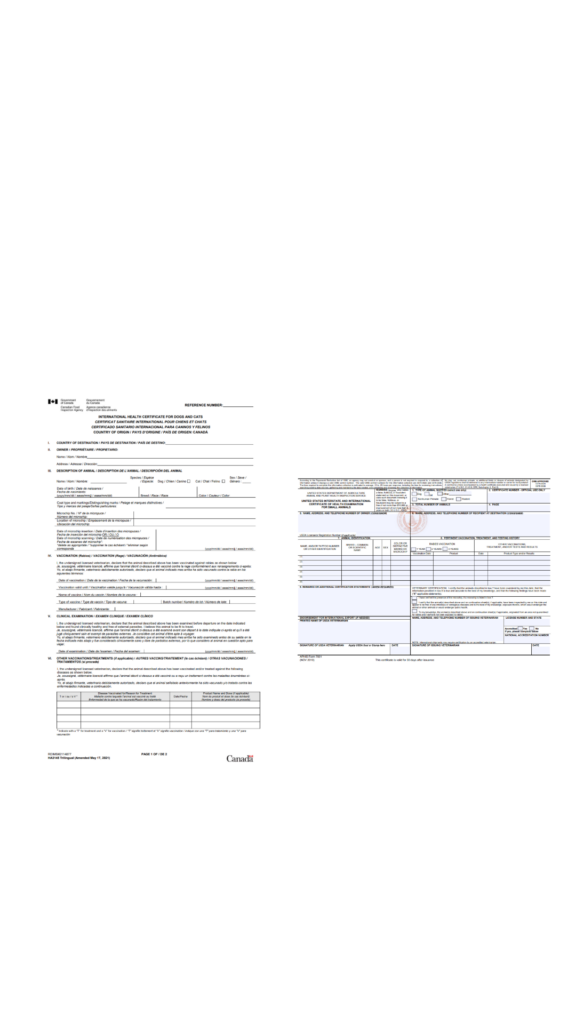If you’ve ever looked up how to travel with your pet or talked to your vet about it, you’ve probably heard the term “health certificate” and that you might need one for your pet. But what is a pet health certificate, and do you actually need it? In this post, I’ll provide information about what a health certificate is, when you pets usually need them, what health certificates look like, and how much they might cost. Whether you’re going on a road trip or moving to another country with your pet, knowing if you need a health certificate can save you time, money, and stress.
What Is A Health Certificate?
As defined by the American Veterinary Medical Association:
“A certificate of veterinary inspection (CVI), also known as a health certificate, is an official document issued by a Federal, State, Tribal, or accredited veterinarian certifying that the animals identified on the document have been inspected and were found to satisfy the regulations pertaining to their intended movement—within the same state, between states, or internationally.”
Think of it as your pet’s passport or travel visa: it is an attestation made in writing by your pet’s licensed or authorized veterinarian that your pet’s identity has been verified, is free from communicable disease, and appears healthy. Whether you’re crossing state lines, traveling to another country, or moving abroad long-term, it’s one of the most important documents to obtain prior to departure.
Other Names For Health Certificates
- Certificate of Veterinary Inspection (CVI)
- Veterinary Health Certificate (VHC)
- Animal Health Certificate
- International Health Certificate
- Fit to Fly Certificate
When Are Health Certificates Required?
While not always required for your pet for each journey, here are times when you’re most likely to need one:
- If your pet is flying in the hold or cargo: Most commercial airlines require a valid health certificate issued within 10 days of departure.
- Find the pet policies of US Commercial Airlines here and Canada Commercial Airlines here.
- Traveling internationally: Many governments require a health certificate for pets to enter, exit, and even transit their jurisdictions.
Like most things when traveling with pets, whether or not you’ll need a health certificate depends on several factors, such as:
- Destination pet import requirements
- Origin pet export requirements
- Transportation provider policies
- The purpose of your pet’s travel
Bodzin Pet Travel Solutions encourages you to talk with your pet’s vet and government authorities to confirm if one is needed, and if so which one. Even if it’s not an explicitly stated requirement: It’s still a good idea to bring one, especially when crossing borders or if your pet may be examined by transportation providers or agriculture authorities. If you or your pet’s vet are unsure whether your pet needs a health certificate, or which type applies to your trip, click here to schedule a consultation. I’m here to guide you every step of the way so you can confidently travel with your pets!
What Does a Health Certificate Look Like?
There’s no single template that works everywhere, and health certificates can vary depending on where you’re going and what information is required about your pet. Here are some of the common formats that vets will work with:
- USDA APHIS Form 7001: This is the standard form used by USDA-accredited veterinarians when no country-specific version exists.
- Canadian International Health Certificate – bilingual/trilingual forms : For use when pets are exported internationally and no negotiated certificate is available.

How Much Do Health Certificates Cost?
Health certificates are not just another form—they come with real costs. Here’s what to expect:
- For domestic travel: Plan to spend at least $150 per pet. This includes the vet’s physical exam and certificate completion.
- For international travel or destinations with strict rules: Expect costs in the $350 to $500 range due to the additional paperwork, review processes, and compliance checks.
- For rush services or highly complex travel: Prices can go up to $700 or more depending on your location, how quickly you need the paperwork, and whether your vet charges extra for international certifications.
- When endorsement is required: add on another $30-$101 for Canada and US departures, and shipping label fees if needed.
Final Thoughts
Whether you’re heading to the next province or relocating across the globe, a health certificate is one of the most important travel documents your pet will need. It’s not just a formality—it proves your pet is your pet, is healthy, compliant, and ready to travel, and it speeds up inspections at borders, airports, and ports of entry.
Remember, your pet may not carry a passport like you, but that paper trail a health certificate provides about them is just as important to help get them safely to their next destination with you.